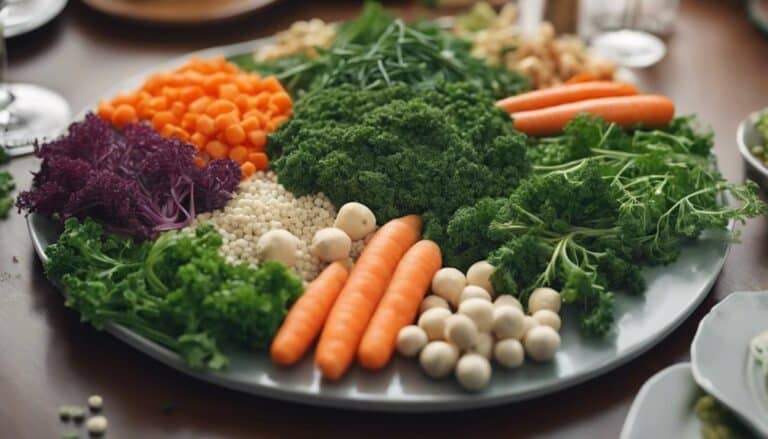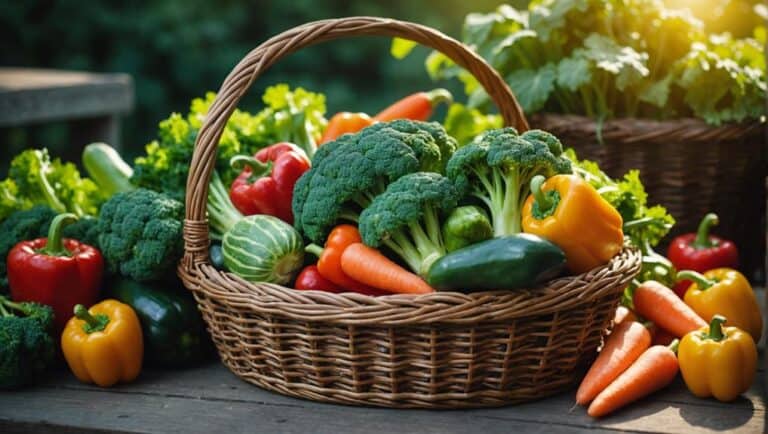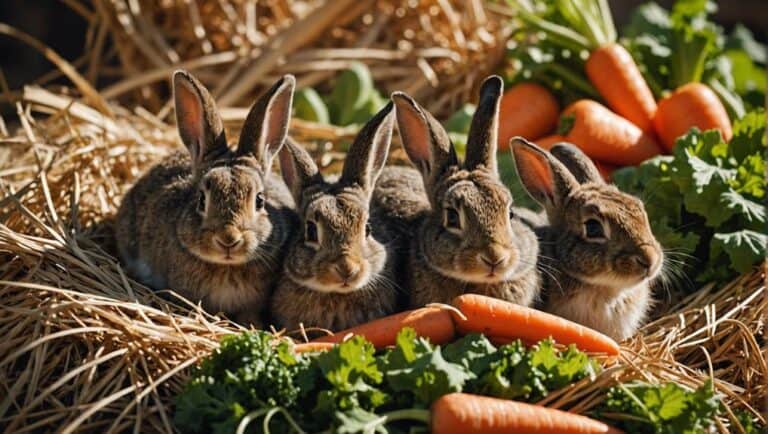How well do you really know what's going on inside your rabbit's digestive system? When it comes to ensuring your furry friend's overall health, a well-balanced diet is vital. But what exactly does that entail? You're probably aware that hay is essential, but did you know that it should make up at least 85% of their daily intake? And what about leafy greens, processed foods, and treats? The answers to these questions can make all the difference in maintaining your rabbit's digestive health. By exploring these key factors, you'll be taking the first step towards a happier, healthier pet.
Contents
Fresh Hay and Water Essentials
With a rabbit's digestive health relying heavily on a diet rich in fiber, fresh, high-quality grass hay should be a staple in their daily menu, comprising the bulk of their nutritional intake. You should provide your rabbit with a daily serving of hay equivalent to at least one bundle that's the same size as they are. This guarantees they receive adequate fiber intake necessary for intestinal health.
Selecting the right type of hay is vital; for ideal nutrition, look for hay that's fresh, green, and free from dust and mold, as emphasized in dietary components for ideal health.
In addition to fresh hay, clean water must be available to your rabbit at all times. Hydration is essential for preventing digestive issues and maintaining overall health in rabbits.
Regularly check and replace the water to make sure it's free from contaminants like algae or freezing, which can impact your rabbit's willingness to drink.
High Fiber Diet for Optimal Health
During the early stages of a rabbit's life, establishing a high fiber diet sets the foundation for ideal health and digestive well-being. You should prioritize a diet consisting of at least 85% grass-based hay to maintain proper digestive health and prevent gastrointestinal stasis.
Providing unlimited access to fresh, high-quality hay daily is essential, with a recommended intake of one rabbit-sized bundle. Hay plays a significant role in promoting dental care and guaranteeing gut health, as it aids in the movement of food through the digestive tract and prevents blockages, making it fundamental for your rabbit's overall wellness importance of hay in a bunny's diet.
Leafy greens should also be included, with a daily serving of about 1 cup per 5 lbs of body weight, but these shouldn't replace hay as the primary component of their diet. A high fiber diet is indispensable for providing rabbits with essential vitamins and minerals, and for promoting regular digestive health.
Inadequate fiber intake can lead to serious digestive issues, including obstructions and poor gut motility. Regularly monitor your rabbit's fecal pellets to verify they're producing normal, round droppings. Any changes in consistency can indicate fiber deficiencies and potential health problems that need addressing.
Avoid Processed Foods and Treats
Most rabbit owners are unaware that many commercial rabbit foods and treats can do more harm than good to their pet's health. Processed foods, particularly muesli-style blends, are detrimental to your rabbit's digestive health due to their high sugar and low fiber content.
These diets can lead to serious dental and digestive problems, obesity, and even gastrointestinal stasis, a severe condition requiring immediate veterinary care. To maintain ideal digestion, it's crucial to prioritize a diet rich in Timothy hay essential for rabbit health, as it provides the necessary fiber and nutrients for your rabbit's well-being.
When selecting rabbit food, always check the ingredient labels to verify they contain primarily high-quality hay, fresh leafy greens, and minimal to no processed additives.
Avoid pellets that are high in processed ingredients, as they can cause nutritional deficiencies and digestive issues. Instead, maintain a consistent high-fiber diet with fresh hay as the primary component.
You can also offer occasional small amounts of safe treats, such as certain vegetables or herbs, to enrich your rabbit’s diet while avoiding processed snacks. These safe treats not only provide variety but also encourage natural foraging behaviors in your rabbit. It’s important to introduce new foods gradually to monitor for any adverse reactions. If you’re wondering, ‘can rabbits eat lady fingers,’ the answer is yes, but it should be given in moderation and as part of a balanced diet to ensure optimal health.
Monitor Droppings for Health Signs
You play an important role in maintaining your rabbit's digestive health by paying attention to their droppings, which serve as a window into their digestive function. Regularly monitoring droppings allows you to detect potential health issues early on, ensuring prompt veterinary attention when needed.
A healthy rabbit produces two types of droppings: firm fecal pellets and soft cecotropes, indicating normal digestive function. Fecal pellets should be small, round, and dry, while cecotropes should be soft and dark. Any significant changes in size, consistency, or quantity may signal underlying health issues, such as gastrointestinal stasis or dietary problems.
Failure to consume cecotropes can reflect digestive issues, and a sudden decrease in fecal output or signs of diarrhea warrant immediate veterinary consultation. By monitoring droppings, you can assess the quality of your rabbit's digestive system and take prompt action to address any concerns, ultimately ensuring their health and welfare.
Adapt Diet to Individual Needs
Every rabbit is unique, with varying needs based on their age, size, health status, and breed. As a responsible pet owner, you must adapt their diet to meet these individual needs.
Young rabbits and lactating does require higher nutrient intake, so make certain they receive high-quality food rich in vitamins and minerals. Monitor your rabbit's weight regularly and adjust food portions accordingly to maintain a healthy body condition.
Different breeds may have varying dietary requirements; for instance, Angora rabbits may need additional protein and fat for their fur quality. When introducing new foods, do so gradually to prevent digestive upset in your rabbit's digestive system.
Consult with a veterinarian to tailor your rabbit's diet based on their unique health conditions, as certain issues may necessitate specific dietary modifications. By adapting their diet to their individual needs, you can promote a healthy digestive tract and soft fecal pellets, making sure your pet rabbits thrive.
Final Thoughts
By following these 5 essential tips, you'll be well on your way to supporting your rabbit's digestive health. Remember, an ounce of prevention is worth a pound of cure – a high-fiber diet and careful monitoring can prevent costly vet bills down the line. By prioritizing fresh hay, avoiding processed foods, and adapting to individual needs, you'll be giving your rabbit the best chance at a long, healthy life. Take control of your rabbit's nutrition today and reap the rewards of a happy, thriving pet.






